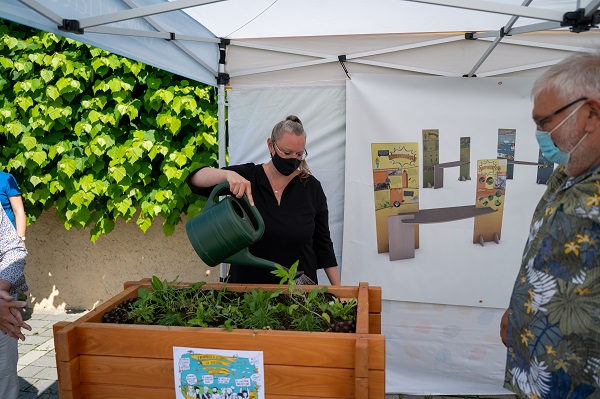 Carole Dieschbourg, Luxembourg's Minister for the Environment, Climate and Sustainable Development;
Credit: Oli Frisch
Carole Dieschbourg, Luxembourg's Minister for the Environment, Climate and Sustainable Development;
Credit: Oli Frisch
Luxembourg's three nature parks have announced the official launch of the project "D‘Naturparken zu Lëtzebuerg - (een) Insekteräich" (nature parks in Luxembourg - (an) insect kingdom), the objective of which is to implement measures for and raise awareness about insect protection.
Biodiversity and insect biomass are declining rapidly around the world. This situation is alarming, because insects play a central role in the functioning of our ecosystems. In order to counteract this decline, Upper Sûre Nature Park, Nature Park Our and Nature- & Geopark Mëllerdall (Mullerthal) have jointly launched an insect protection project, funded by Luxembourg's Ministry of the Environment, Climate and Sustainable Development.
The aim of the project is to raise awareness and implement large-scale measures for the protection of insects. Since selective measures in protected areas do not go far enough, it is also important to promote measures on various areas outside protected areas, such as in green spaces or gardens. Success in insect protection can only be achieved through a comprehensive project with as wide an impact as possible. Consequently, different actors in the region will be involved in raising awareness of the issue and working with the nature parks to implement targeted measures.
In addition, a large-scale and long-term trapping network will be established in order to have a solid database to develop targeted protection strategies and scientifically document the success of the various actions.
Pulic sector
Public structures play an important role as they own and manage land both in residential areas and in green spaces. Planned actions in this sector include raising awareness among municipal politicians and training employees, professional follow-up with a view to a redevelopment close to nature, improvement and maintenance of public spaces, identification and adaptation of the management of so-called “Eh-Da Flächen” areas (areas that exist anyway).
General public
In collaboration with the National Museum of Natural History (MNHN), the three nature parks are working on a travelling exhibition entitled "INSECTS - Superhelden in Gefahr" (Insects - Superheroes in danger). This will be ready in time for the reopening of schools in September and will be exhibited in a first stage in the primary schools of the municipalities of the three nature parks. The exhibition aims, on the one hand, to arouse interest and fascination with insects and, on the other hand, to encourage commitment to greater biodiversity. An activity programme will accompany the exhibition, which is aimed mainly at primary school classes in cycles 3 and 4 as well as interested families and adults. The exhibition is in German, with a French translation provided via an app. For further information (currently available only in German), visit www.insekten.lu.
Other actions include raising awareness among the public about planting gardens and balconies close to nature and insects, as well as about sustainable consumption behaviour.
Businesses and industrial areas
A naturally designed industrial area offers a good opportunity to create micro-habitats and structures that serve as staging biotopes for mobile species, thus countering the increasing loss of species. Planned actions thus include raising awareness and providing advice on the ecological redesign and maintenance of business surfaces, training plant nurseries for the pesticide-free breeding of native wild plants and increasing the supply of native plant seeds.
Farmers
Since around half of the area of the three Luxembourg nature parks is used as agricultural space, effective insect conservation in terms of area can only be successful in close collaboration with farmers. Measures to promote insects, complementary to Luxembourg's agro-environmental and climatic measures and to the existing biodiversity contracts, will be implemented for the areas which are used more intensively, in close collaboration with farmers, advisory services and the Ministry of Agriculture, in order to create the missing corridors. Planned actions include awareness-raising and targeted extension for the implementation of existing and new programmes.
Evaluation
The presence or absence of a species says a lot about a habitat and its environment. The species present in the collected samples are determined using DNA-meta-bar coding. Traps were therefore installed in each nature park to record the biomass and the diversity of insects in the traditional open landscape. Additional traps will allow the success of certain park measures to be assessed. In addition, a study is being carried out to compare the lists of plants from the 1950s to the 1970s for specific grids of 1 km² with the lists produced today.
Citizen Science project: “Insekteräich Naturparken”
As part of their project, Luxembourg's three nature parks are appealing to those interested to participate in the iNaturalist challenge. From 3 July until 3 October 2021, the goal is to photograph as many insects as possible and then upload the photos to the iNaturlist platform. iNaturalist is accessible via its website www.inaturalist.lu or via its mobile application (iOS / Android).








